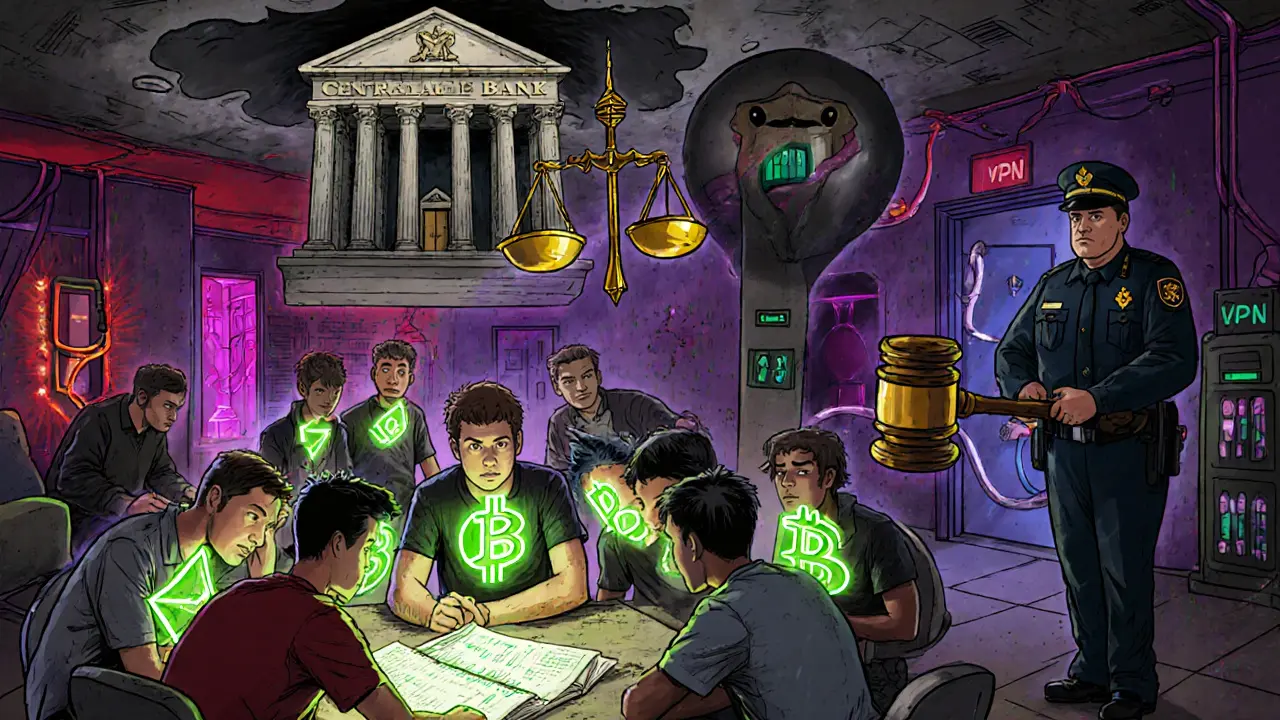
- 25 Oct 2025
- Elara Crowthorne
- 25
Egypt Crypto Penalty Calculator
Penalty Calculator
Calculate potential penalties for crypto activities under Egypt's current regulations. This tool is for informational purposes only and does not constitute legal advice.
Your Potential Penalties
Note: Enforcement tends to focus on high-profile cases rather than small investors. Penalties shown represent maximum possible consequences under Egyptian law.
Important: This is for informational purposes only. This tool does not constitute legal advice. Consult a qualified attorney for personalized guidance.
Imagine trying to hide a hobby that the government has outright outlawed. That’s the reality for anyone dabbling in digital money in Egypt, where a strict legal ban coexists with rumors of millions still holding crypto assets.
The legal landscape: Egypt’s complete crypto ban
Cryptocurrency in Egypt is defined by a sweeping prohibition under the Central Bank and Banking System Law No. 194 of 2020. The law’s Article 206 bars any individual, bank, or financial institution from issuing, trading, or promoting crypto assets without prior approval from the Central Bank of Egypt (CBE).
The ban places Egypt alongside countries like Afghanistan, Bangladesh, and China that have opted for an all‑or‑nothing approach. Penalties are steep: violators can face up to ten years in prison and fines ranging from 1 million to 10 million Egyptian pounds (roughly $32,000 - $320,000). The CBE’s rationale is simple-cryptos are volatile, can fuel fraud, and may be used for money‑laundering or terrorism financing.
Why the figure ‘3 million’ keeps surfacing
Whenever the headline "3 million crypto holders in Egypt" appears, the first question is: where does that number come from? Official statistics don’t exist because the activity is illegal. Most estimates are based on indirect signals-global exchange data, anecdotal reports from Egyptian users on social media, and market‑research firm extrapolations.
Because every transaction is meant to stay off the radar, reliable counting is nearly impossible. The figure should be taken as a rough guess rather than a documented fact. What we do know is that a segment of the population, especially younger tech‑savvy individuals, continues to explore crypto despite the risk.
Enforcement realities: how Egypt tries to police crypto
Enforcing a blanket ban on a decentralized technology is a cat‑and‑mouse game. The CBE monitors banks for suspicious transfers, collaborates with the Ministry of Interior to track illicit platforms, and runs public awareness campaigns warning of the legal consequences.
However, the pseudonymous nature of most blockchains makes detection challenging. Crypto‑friendly peers, VPNs, and overseas exchanges provide loopholes. The government’s heavy fines and prison terms act more as deterrents than absolute barriers, and enforcement tends to focus on high‑profile cases rather than every small investor.

Regional context: other nations with total bans
Egypt isn’t alone in its hard‑line stance. Below is a quick snapshot of countries that have adopted similar policies.
| Country | Legal Basis | Typical Penalties | Notable Enforcement Note |
|---|---|---|---|
| Egypt | Central Bank and Banking System Law No. 194 (2020), Art. 206 | Up to 10 years imprisonment; EGP 1‑10 million fines | Focus on banks & exchanges; heavy public warnings |
| Algeria | Law on the Prevention of Money Laundering (2008) | Up to 5 years imprisonment; fines up to €200,000 | All crypto‑related activities deemed illegal |
| Morocco | Foreign Exchange Regulation (2018) | Up to 2 years imprisonment; fines up to 500,000 MAD | Bank Al‑Maghrib treats crypto as a financial asset, not currency |
| Bangladesh | Bangladesh Bank Circular (2014) | Up to 5 years imprisonment; fines up to BDT 1 million | Strict monitoring of banking channels |
| China | People’s Bank of China directives (2021) | Severe fines; business shutdowns; possible jail time | Crackdown on mining and exchange platforms |
Signs of change: licensing talks and a possible regulatory shift
Even the strictest regimes can evolve. Recent reports suggest the CBE is drafting a framework that could allow limited licensing for crypto‑related companies. The idea is to bring activities under supervision rather than push them entirely underground.
Such a move would mirror what a few other jurisdictions have done-granting licenses to exchanges, custodians, or even stable‑coin issuers while keeping a tight grip on AML/KYC compliance. No official timeline exists yet, but the discussion indicates the government sees value in a controlled approach, perhaps to capture tax revenue or to stay competitive in fintech innovation.

Practical takeaways for Egyptians and observers
- Risk awareness: Anyone holding or trading crypto in Egypt does so at personal legal risk. Understanding the penalties is essential.
- Off‑shore solutions: Many users turn to foreign exchanges that don’t require Egyptian KYC, but this raises cross‑border compliance questions.
- Stay informed: Regulatory drafts can change quickly. Follow CBE announcements and reputable news sources.
- Consider alternatives: For those looking for blockchain benefits without legal exposure, projects like private‑ledger solutions for supply chain may be safer.
- Future opportunity: If licensing becomes a reality, early adopters who have built compliant operations could gain a first‑mover advantage.
Frequently Asked Questions
Is it illegal to own Bitcoin in Egypt?
Yes. The Central Bank and Banking System Law explicitly forbids individuals from possessing, buying, or selling Bitcoin without a license, which currently does not exist.
What penalties could I face for using crypto?
Penalties range from imprisonment (up to ten years) to fines between 1 million and 10 million Egyptian pounds, depending on the severity of the violation.
Why do some sources claim there are 3 million crypto users?
The figure is an estimate based on indirect data like exchange activity and social‑media surveys. No official count exists because crypto usage is hidden by law.
Can the ban be lifted or softened?
The CBE is reportedly drafting a licensing framework, signaling a possible shift toward regulated crypto services, but no concrete timeline is public yet.
How does Egypt’s ban compare to other African countries?
Like Algeria and Morocco, Egypt imposes a total ban, while nations such as South Africa and Kenya have adopted more permissive, regulatory‑focused approaches.

25 Comments
Wow, another government deciding to outlaw something nobody can actually control, huh???
Only Egypt thinks it can magically erase digital money. Newsflash: tech doesn’t care about borders, and people will find ways around any ban.
I get why people keep using Bitcoin despite the risk. If you’re in Egypt, stay safe, keep your holdings private, and watch the news for any regulatory changes.
The ban in Egypt is a textbook example of regulation trying to outrun technology.
While the law paints crypto as a tool for illicit finance, the reality is more nuanced.
Many young Egyptians view Bitcoin as a hedge against inflation and a gateway to global markets.
The Central Bank's heavy fines may deter casual traders but cannot extinguish a decentralized network.
Enforcement agencies focus on the obvious targets: banks and high‑profile exchange operators.
Small‑scale holders often hide their assets in hardware wallets or use VPNs to access overseas platforms.
This cat‑and‑mouse game creates a parallel economy that operates under the radar.
Studies from regional fintech analysts suggest that illicit activity represents a minority share of total crypto volume.
Moreover, the social media chatter among Egyptian tech circles reveals a thriving community sharing knowledge on privacy tools.
The government's draft licensing framework could signal a pragmatic shift, acknowledging that outright bans are unsustainable.
If licenses are issued, they will likely come with stringent AML/KYC requirements, mirroring models in Malta or Singapore.
Early adopters who have already built compliant infrastructures might find themselves in an advantageous position.
Conversely, those who keep everything off‑shore may face cross‑border regulatory scrutiny as international cooperation tightens.
In the broader Middle Eastern context, Egypt's stance is among the most restrictive, but not unique.
Ultimately, the tension between legal prohibitions and technological resilience will shape the next chapter of crypto in the region.
Here are a few practical tips for anyone still holding crypto in Egypt: keep your private keys offline, use a reputable VPN, and consider moving funds to a non‑Egyptian exchange that doesn’t require local KYC. Also, stay updated on CBE announcements – the regulatory landscape can shift quickly.
Great advice! 👍💡
Don’t lose hope! Even with the ban, people find clever ways – like using hardware wallets or joining crypto groups on Telegram. Keep learning and stay safe.
Crypto bans rarely stop innovation; they just push it underground.
It’s fascinating how some governments act like the world revolves around their petty regulations. They’ll write pages of legislation, but the blockchain simply keeps humming along, indifferent to their whims.
While the ban looks harsh, it’s worth noting that enforcement tends to focus on the most visible players, not the average user-so a low‑key approach can keep you under the radar.
That’s a concise summary.
In accordance with the prevailing legal framework, any individual engaging in the acquisition or disposition of cryptocurrency within the jurisdiction of the Republic of Egypt shall be deemed to be in direct violation of Article 206 of the Central Bank and Banking System Law No. 194 of 2020, thereby subjecting themselves to the stipulated punitive measures.
Imagine the drama of a whole nation trying to outlaw a digital revolution! The young tech‑savvy crowd in Egypt is practically staging their own silent protest, swapping coins in the shadows while the authorities scramble for clues.
Honestly, it’s the same old story – governments get scared of anything they don’t understand. They’ll crack down, talk tough, and then the crypto community just moves on.
Yo, real talk – if you’re holding BTC in Egypt, make sure it’s in a hardware wallet and use a VPN. The ban isn’t going away short‑term, so keep your stuff hidden.
Adding to the earlier points, it’s crucial to stay aware of any updates from the Central Bank and to diversify holdings if possible, reducing exposure to a single asset class.
While some claim this ban protects citizens, it actually stifles innovation and drives talent abroad – a short‑sighted policy that benefits no one.
We often forget that fear of the unknown fuels many of these policies. A measured, philosophical approach would consider both the risks and the potential societal benefits of emerging technologies.
From a cultural standpoint, the ban reflects a tension between tradition and modernity. Yet, the resilience of the community shines through – keep your crypto safe, stay informed, and perhaps one day the regulations will evolve. 😊
Sure, the government says crypto is dangerous, but the real danger is missing out on financial freedom. Keep calm and HODL.
Interesting perspective! 🤔
Just another reminder that regulations often lag behind technology. It’ll be interesting to see how this plays out.
Honestly, most of these bans are just political theater. The real question is whether people will keep using crypto despite the risk.
One must consider the hidden forces steering global finance – the crypto ban could be a smokescreen for large‑scale capital controls orchestrated by unseen interests.
Everyone’s quick to label this as oppression, yet the data shows that crypto adoption remains marginal. Maybe the fear is overblown.